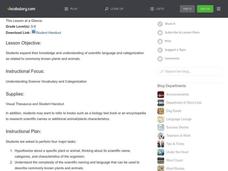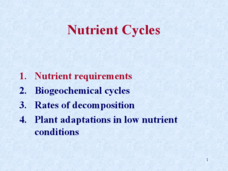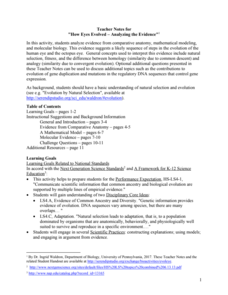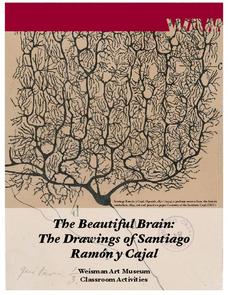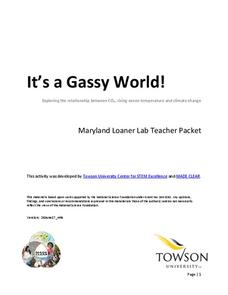Curated OER
Understanding Science Vocabulary and Categorization
Students analyze scientific vocabulary words. In this life science vocabulary lesson, students complete a worksheet using VisualThesaurus as they evaluate words related to plants and animals and how the words are used.
NOAA
Stressed Out!
Are our oceans really suffering due to the choices humans make? The sixth and final installment in the volume of activities challenges research groups to tackle one of six major topics that impact ocean health. After getting to the...
National Wildlife Federation
Green Green Revolution
School budgets don't have a lot of extra money, so when students propose saving the district money, everyone jumps on board. The first lesson in the series of 21 introduces the concept of an energy audit. Scholars form an eco-action team...
Curated OER
Nutrient Cycling
AP environmental science or college-level ecology classes will glean a tremendous amount of information on nutrient cycles from this detailed PowerPoint. It covers nutrient requirements, biogeochemcial cycles, decomposition rates, and...
Broward County Schools
Women's Contributions to the United States
Betsy Ross, Toni Morrison, Sacajawea, Amelia Earhart, Maya Lin, Sally Ride, Judy Baca. No matter the subject area or the grade level you teach you will find much to value in a manual that focuses on the contributions U.S. women have...
Curated OER
What is an Ecological Footprint?
Introduce youngsters to the term ecological footprint. Learners identify ways in which humans affect the environment. They look at the problems associated with the use of natural resources, and focus on ways to preserve natural...
Intel
Designer Genes: One Size Fits All?
In this STEM group of 10 activities, lesson two focuses on the question, "Just because we can, should we?" when considering genetically engineered food. Classes hear a scenario and, as young scientists and geneticists, must determine if...
NOAA
Ocean Acidification
If tap water is more acidic than ocean water, why are we so concerned about ocean acidification? The third installment of a 23-part NOAA Enrichment in Marine sciences and Oceanography (NEMO) program focuses on carbon dioxide levels in...
NOAA
Vertebrates II
Mammals of the ocean unite! Or not. The 20th installment of a 23-part NOAA Enrichment in Marine sciences and Oceanography (NEMO) program investigates how warm-blooded marine mammals survive in water. In the class activity, learners use...
Kenan Fellows
The Little Stuff Can Make a Big Difference
Great things come in small packages! What better way to illustrate this point than a week-long look at nanotechnology? Earth science scholars explore water quality issues through lab activities, then research new innovations in nanotech...
Discovery Education
Market Research and Design: The Headphone Challenge
Watch augmented reality bring classrooms to life. Scholars work in groups to design, build, and market a new pair of headphones meant for children under three. They use an augmented reality app to show their headphones in action as they...
Rivanna Regional Stormwater Education Partnership
Invisible Passengers
How does water pollution affect the organisms living in the water? Use three science experiments to examine how erosion and other pollutants can affect water quality. Each experiment focuses on a different aspect of pollution and...
Serendip
How Eyes Evolved – Analyzing the Evidence
Octopodes existed for hundreds of thousands of years before humans, yet our eyes share many similarities. Scholars analyze the evidence to determine if the evolution of eyes best fits a homology or analogy model. They discuss the issue...
Scholastic
Lesson Four: The Earth, Layers of Earth
Get your hands dirty with a set of earth science activities! Class members delve into a hard-boiled egg to find the similarities to the earth's layers, create a papier-mâché model of the earth, craft a simulation of the earth's...
Columbus City Schools
Keeping It Hot!
Hot off the presses, this collection of thermal energy activities, lessons, and printables is sure to amaze. Demonstrate how thermal energy moves about in a system using simple materials. Pupils demonstrate their understanding...
University of Minnesota
Beautiful Brain: Strangest Dream
Do words change or add meaning or interest to a work of art? The final lesson in a four-part series on the beautiful brain as a work of art focuses on art analysis. Scholars write a story about exploring art from the inside. Reflections...
Curated OER
Fracking: Positive or Negative Impact?
Your teenagers may have heard of fracking, but do they really know what it is? And could they debate the benefits and risks? Educate your environmental science class with a lesson about hydraulic fracturing, non-renewable energy sources,...
Columbus City Schools
Transformation: Energy in Disguise
Energy transformations happen everywhere, every second of the day. The energy transformation common to most scholars is potential and kinetic energy. The three-week lesson covers multiple types of energy transformations through...
Towson University
It's a Gassy World!
How much does your class know about the relationship between climate change and carbon dioxide? Science scholars explore the nature of greenhouse gases and rising ocean temperature through demonstrations, research, and experiments. The...
Curated OER
Exploring the Sky: Reading Maria's Comet
Discover the science behind astronomy. After reading the book Maria's Comet, which is about a young woman who breaks new ground by becoming a female astronomer, young learners practice reading comprehension with worksheet questions about...
Earth Day Network
Filtering Water
See the water filtration system up close with a fun science experiment. Young scientists work for several class periods to design a water filter using household objects, and then decide which filter material would be most effective in...
University of Colorado
Phases of Charon
Pluto, although no longer considered a planet, has five moons. Pluto's moon, Charon, is the focus of a resource that describes how the moon is viewed from the surface of Pluto. Photos help individuals see how Charon would look at...
Kenan Fellows
Sustainability: Learning for a Lifetime – The Importance of Water
Water is essential for life—and understanding the importance of clean drinking water is essential in understanding sustainability! Show your environmental science class the basics of water testing and treatment through a week-long...
Institute of Electrical and Electronics Engineers
Engineered Music
Sound engineers investigate the structural design of a musical instrument, the recorder. They work in collaborative groups to choose an instrument to build out of everyday craft materials. It must be able to repeat a three-note sequence...


